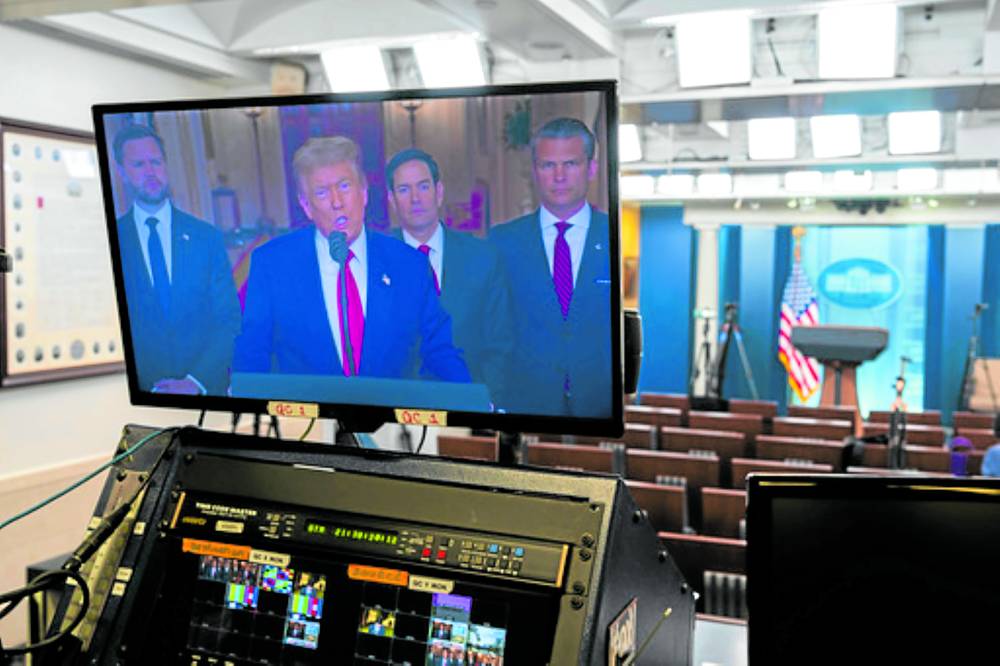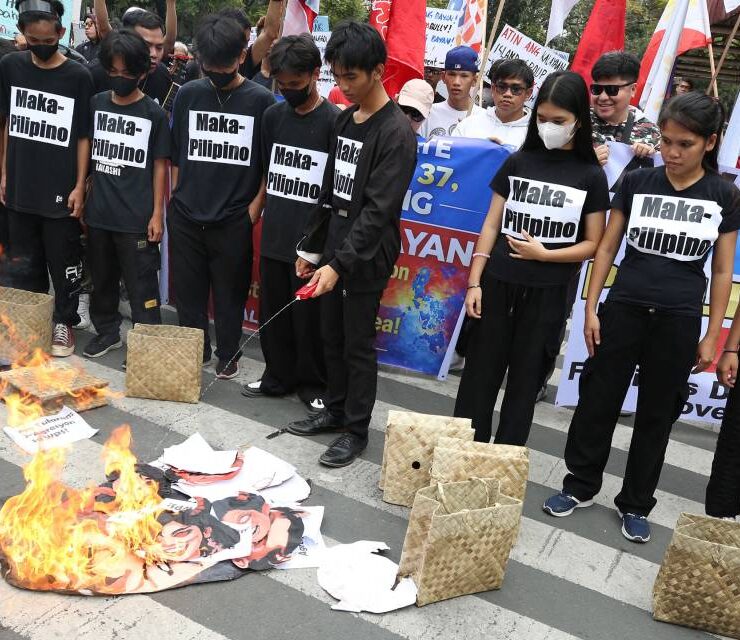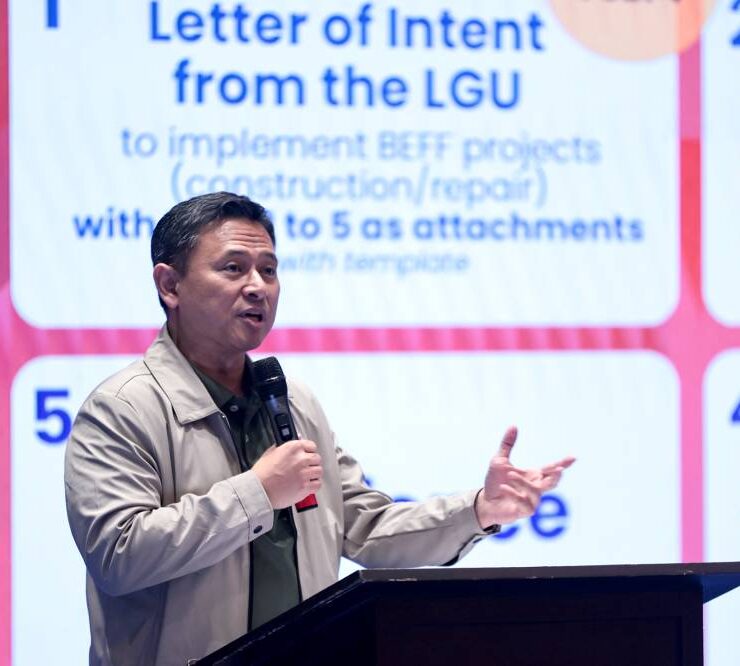US strikes nuke sites as it joins war vs Iran

WASHINGTON—US forces struck Iran’s three main nuclear sites, President Donald Trump said late on Saturday, as he warned Tehran it would face more devastating attacks if it does not agree to peace.
After days of deliberation and long before his self-imposed two-week deadline, Trump’s decision to join Israel’s military campaign against its major rival marks a major escalation of the conflict and risks opening a new era of instability in the Middle East.
“The strikes were a spectacular military success,” Trump said in a televised address. “Iran’s key nuclear enrichment facilities have been completely and totally obliterated.”
In a speech that lasted just over three minutes, Trump said Iran’s future held “either peace or tragedy” and warned there were many other targets that could be hit by the U.S. military.
“If peace does not come quickly, we will go after those other targets with precision, speed and skill,” he said.
No regime change
But Washington also reached out diplomatically to Tehran on Saturday to say the strikes are all it planned and it does not aim for regime change, as CBS News reported.
Trump said US forces struck Iran’s three principal nuclear sites: Natanz, Isfahan and Fordow.
He told Sean Hannity of Fox News that six bunker-buster bombs were dropped on Fordow, while 30 Tomahawk missiles were fired against other nuclear sites.
Speaking on condition of anonymity, a US official told Reuters B-2 bombers were involved in the strikes.
“A full payload of BOMBS was dropped on the primary site, Fordow,” Trump posted on Truth Social. “Fordow is gone.”
No signs of contamination
Reuters had reported earlier on Saturday the movement of the B-2 bombers, which can be equipped to carry massive bombs that experts say would be needed to strike Fordow, which is buried beneath a mountain south of Tehran.
Given its fortification, it will likely be days, if not longer, before the impact of the strikes is known.
An Iranian official, cited by Tasnim news agency, confirmed part of the Fordow site was attacked by “enemy airstrikes.”
However, Mohammad Manan Raisi, a lawmaker for the city of Qom, near Fordow, told the semi-official Fars news agency the facility had not been seriously damaged.
The International Atomic Energy Agency said on Sunday there was no increase in off-site radiation levels reported, while Iranian media quoted Iran’s nuclear body as saying there were no signs of contamination and no danger to residents living nearby.
Hassan Abedini, deputy political head of Iran’s state broadcaster, said Iran had evacuated the three sites some time ago.
“The enriched uranium reserves had been transferred from the nuclear centers and there are no materials left there that, if targeted, would cause radiation and be harmful to our compatriots,” he told the channel.
Diplomacy fails
Israeli Prime Minister Benjamin Netanyahu congratulated Trump on his “bold decision.”
“History will record that President Trump acted to deny the world’s most dangerous regime the world’s most dangerous weapons,” Netanyahu said.
The strikes came as Israel and Iran have been engaged in more than a week of aerial combat that has resulted in deaths and injuries in both countries.
Israel launched the attacks on Iran on June 13, saying it wanted to remove any chance of Tehran developing nuclear weapons, while Iran has said its nuclear program is for peaceful purposes only.
Diplomatic efforts by Western nations to stop the hostilities have so far failed. United Nations Secretary-General Antonio Guterres called Saturday’s strikes a “dangerous escalation in a region already on the edge—and a direct threat to international peace and security.”
The attacks by both sides on energy infrastructure—including Iran’s South Pars gas field—have fueled fears of a spike in oil prices, compounded by Iran targeting shipping in the Straits of Hormuz and the risk of a complete shutdown of its oil production. Iran is a member of the Organization of the Petroleum Exporting Countries (Opec).
‘Not constitutional’
Democratic lawmakers and some Republicans have argued that Trump must receive permission from Congress before committing the US military to any combat against Iran.
Republican Sen. Roger Wicker of Mississippi, chair of the Senate Armed Services Committee, applauded the operation but warned the US now faced “very serious choices ahead.”
Republican Rep. Thomas Massie of Kentucky simply said “This is not constitutional,” while Democratic Rep. Alexandria Ocasio-Cortez said the strikes were “absolutely and clearly grounds for impeachment.”
Many in Trump’s Make America Great Again (Maga) movement oppose US entanglement in foreign military operations.
But Trump-aligned commentator Charlie Kirk posted on X: “America stands with President Trump.”
Meanwhile Trump ally Steve Bannon said on his War Room podcast the president’s address was probably not what a lot of Maga supporters wanted to hear.
Bannon called on Trump to offer a “deeper explanation” for why US involvement was necessary.
‘Iraq mistake’
The response by world leaders ranged from Israel lauding the US strikes to the United Nations calling for de-escalation, while Iran and some other nations condemned the attacks.
Antonio Guterres, secretary general of the UN which marks its 80th year on Oct. 24, warned “There is a growing risk that this conflict could rapidly get out of control—with catastrophic consequences for civilians, the region, and the world.”
“I call on Member States to de-escalate,” Guterres said. “There is no military solution. The only path forward is diplomacy.”
A flash commentary from China’s government-run media asked whether the US is repeating “its Iraq mistake in Iran.”
“History has repeatedly shown that military interventions in the Middle East often produce unintended consequences, including prolonged conflicts and regional destabilization,” said an online piece by CGTN, the foreign-language arm of the state broadcaster, as it cited the US invasion of Iraq in 2003.
On June 16, about a week before the US airstrikes, aircraft carrier USS Nimitz left the South China Sea and sailed toward the Middle East.
The Nimitz Carrier Strike Group conducted maritime security operations a week earlier in the South China Sea as “part of the US Navy’s routine presence in the Indo-Pacific,” according to the website of the Commander of the US Pacific Fleet.
‘Everlasting consequences’
Japan’s Prime Minister Shigeru Ishiba was scheduled to hold a meeting with key ministers on Sunday to discuss the impact of the US attack, while South Korea’s presidential office said it would also hold an emergency meeting on Sunday.
Australia, which shuttered its embassy in Tehran and evacuated staff on Friday, continued to push for a diplomatic end to the conflict.
“The security situation in the region is highly volatile. We continue to call for de-escalation, dialogue and diplomacy,” an official said in a statement, even as it also noted that “Iran’s nuclear and ballistic missile program has been a threat to international peace and security.”
Iranian Foreign Minister Abbas Araghchi said on X the US “committed a grave violation of the UN Charter, international law and the (Treaty on the Non-Proliferation of Nuclear Weapons) by attacking Iran’s peaceful nuclear installations.”
Iran, like the US and Israel, is a member-state of the UN.
“The events this morning are outrageous and will have everlasting consequences,” Araghchi said. “In accordance with the UN Charter and its provisions allowing a legitimate response in self-defense, Iran reserves all options to defend its sovereignty, interest, and people.”
At least 430 people have been killed and 3,500 injured in Iran since Israel began its attacks, Iranian state-run Nour News said, citing the health ministry.
In Israel, 24 civilians have been killed and 1,272 people injured, according to local authorities. —WITH A REPORT FROM AP
Reuters, the news and media division of Thomson Reuters, is the world’s largest multimedia news provider, reaching billions of people worldwide every day. Reuters provides business, financial, national and international news to professionals via desktop terminals, the world's media organizations, industry events and directly to consumers.





















